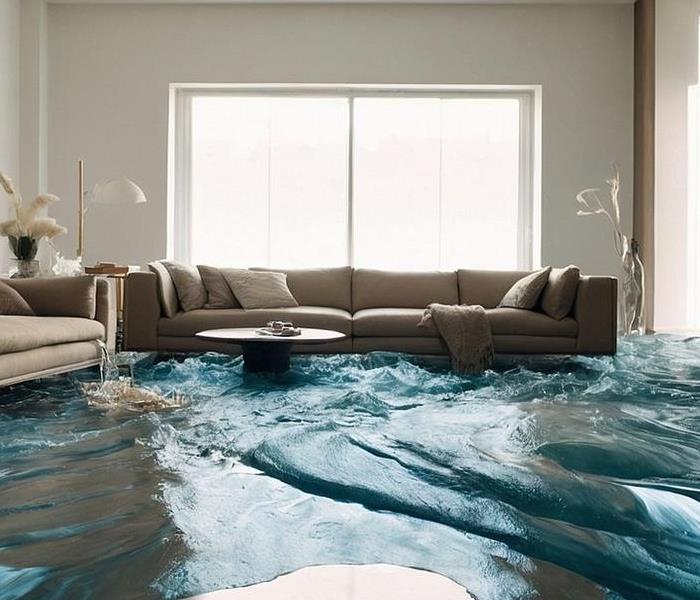Archived Water Damage Blog Posts
What To Do When You Have Water Damage
4/19/2024 (Permalink)
Water damage can wreak havoc on your home or property. Water damage can occur from burst pipes, leaking roofs, storms, floods, and hurricanes. The consequences can be devastating, leading to structural damage, mold growth, and potential health effects.
When facing these situations, it is best to contact a restoration company like SERVPRO. However, here are some simple actions you can take while you wait on a SERVPRO team to arrive at your home.
Turn off the Power
Attempt to safely switch off the electricity and gas to avoid electrocution and gas leaks. If unable to do so due to an extensive amount of water in the home, wait for a SERVPRO team to arrive and cut the power off.
Locate and Stop the Water Source
Identify where the water is coming from. If it is coming from a burst pipe or leaking appliance, turn off the water supply to prevent further flooding.
If the source of the water is external, such as a storm or flooding, do your best to divert or contain the water from further damaging your home and furniture.
Remove Excess Water
Use pumps, wet/dry vacuums, buckets, or towels to remove as much water as possible from the affected area. The faster you can extract the water, the better chance you have of preventing further damage and mold growth.
Move Belongings Out of Water
To prevent further damage to your furniture, move them to another room that is dry. If you have heavy furniture that you are unable to lift and move around, wait for a SERVPRO team to arrive to assist with moving the furniture.
SERVPRO also specializes in restoring any piece of furniture that has been damaged during the disaster.
Call your Insurance Company
Once you have done all the above, now is the time to contact your insurance company and investigate what is covered in terms of water damage. Document the damage thoroughly and file a claim with your insurance as soon as possible in order for you to get reimbursed for the costs of mitigation.
Dealing with water damage is a long and stressful process. Luckily, SERVPRO is available 24/7 with a team of certified professionals who are equipped with advanced equipment to resolve disasters like these.
SERVPRO, the only restoration company that makes “Like it never even happened,” happen.
Signs That It's Time for a Professional Plumbing Inspection
4/20/2023 (Permalink)
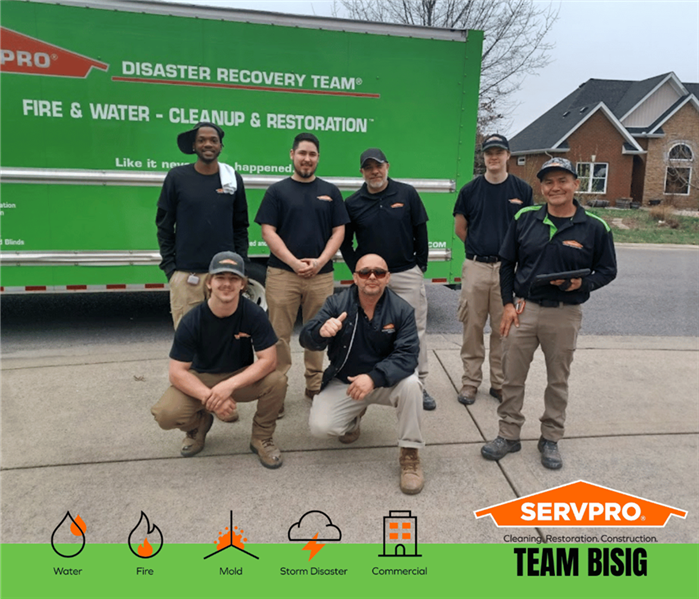 Our local SERVPRO team is here to help 24/7/365. Whether you live in Dekalb County, Brookhaven, or anywhere in between.
Our local SERVPRO team is here to help 24/7/365. Whether you live in Dekalb County, Brookhaven, or anywhere in between.
A well-functioning plumbing system is vital for the comfort and safety of your home or business. Over time, pipes and fixtures can develop issues that may lead to water damage if not addressed promptly. Regular professional plumbing inspections can help you avoid costly repairs and the need for water damage restoration services. In this blog post, we'll explore the signs that it's time to call in the experts for a plumbing inspection at your property.
- Persistent Clogs and Slow Drains A common plumbing issue that warrants a professional inspection is the presence of persistent clogs or slow-draining sinks, tubs, and toilets. These problems can indicate a blockage in the pipes or a more serious issue like a collapsed or damaged sewer line. A professional plumber can diagnose the cause of the problem and recommend the best course of action for resolving it, potentially saving you from the need for water damage restoration services down the line.
- Unusual Sounds or Odors If you notice strange sounds, such as gurgling or banging, coming from your pipes or fixtures, it's a sign that something isn't right within your plumbing system. Similarly, unpleasant odors like sewage or musty smells can indicate a problem with your pipes, drains, or venting system. A professional inspection can help pinpoint the source of the issue and recommend the necessary repairs or maintenance to prevent further damage.
- Water Stains and Visible Mold Growth Water stains on your walls, ceilings, or floors can indicate a hidden leak in your plumbing system. Mold growth, especially in areas where it wasn't previously present, is another sign that you may have a plumbing issue. Mold thrives in damp environments, and its presence can signify a leak or excess moisture from a plumbing problem. Addressing these issues promptly can help prevent the need for extensive water damage restoration efforts.
- Increased Water Bills A sudden spike in your water bill may be a sign that you have a hidden leak in your plumbing system. If you haven't increased your water usage but your bill has gone up, it's worth having a professional inspection to identify any issues that may be causing the increase. Fixing leaks and addressing other plumbing problems can help you save on your water bill and avoid the need for water damage restoration services.
- Discolored or Rusty Water If you notice discolored or rusty water coming from your faucets, it may be a sign that your pipes are corroded or damaged. This can lead to leaks and other issues that can cause significant water damage if not addressed promptly. A professional plumbing inspection can help you determine the cause of the discolored water and recommend the necessary repairs to prevent further damage.
The Importance of Professional Plumbing Inspections
Regular professional plumbing inspections are essential for maintaining the health and safety of your home or business. By identifying and addressing potential issues early, you can avoid costly repairs and the need for water damage restoration services. At SERVPRO of NW Dekalb/Dunwoody/Brookhaven, we understand the importance of proactive plumbing maintenance and are here to help you keep your property in top condition.
Conclusion:
Don't wait until you're faced with significant water damage to address plumbing issues. By watching for the signs that it's time for a professional plumbing inspection and taking action when needed, you can protect your property from costly repairs and the need for water damage restoration services. If you suspect that you have a plumbing issue or would like to schedule a routine inspection, contact SERVPRO of NW Dekalb/Dunwoody/Brookhaven today. Our team of experienced professionals is here to help you maintain a safe, healthy, and comfortable environment in your home or business.
Navigating Insurance Claims for Water Damage: Expert Tips and Tricks
3/27/2023 (Permalink)
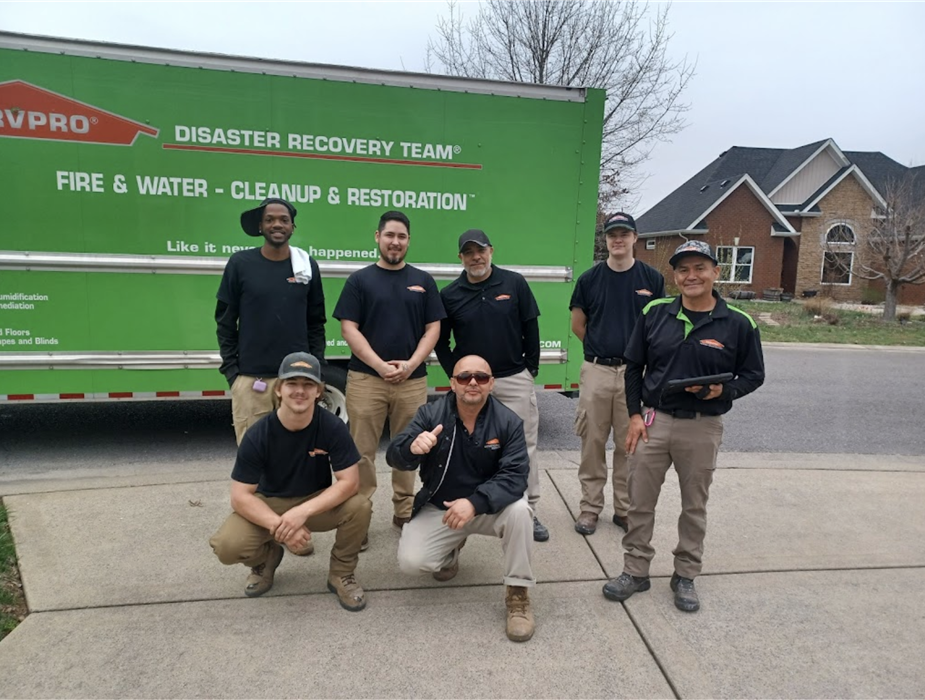 Our emergency response team is available to respond to your flood or water leak emergency 24/7/365 Here in Dekalb County.
Our emergency response team is available to respond to your flood or water leak emergency 24/7/365 Here in Dekalb County.
Dealing with water damage can be a stressful and overwhelming experience. Whether it's due to flooding, a burst pipe, or a leaking roof, water damage can wreak havoc on your property, possessions, and peace of mind. One of the critical aspects of handling water damage is navigating the insurance claims process. Knowing what to expect and how to maximize your claim can make a significant difference in your recovery. With many years of experience serving Buford, Suwanee, Hamilton Mill and surrounding areas, we wrote this blog to provide expert tips and tricks on navigating insurance claims for water damage. This way, you can secure the compensation you deserve while ensuring a smooth claims process.
Understanding Your Insurance Policy
The first step in navigating insurance claims for water damage is understanding your insurance policy. It's crucial to be familiar with the terms and conditions, as well as the extent of coverage provided. Some policies cover water damage from sudden and accidental events, while others exclude specific causes such as flooding. Here are a few tips to help you understand your policy:
- Review your policy documents and declarations page, which will outline your coverage limits and deductibles.
- Identify the specific perils covered and any exclusions, paying close attention to water damage-related incidents.
- Contact your insurance agent or company if you have any questions or need clarification about your coverage.
Documenting the Damage and Initiating the Claim
Once you have a clear understanding of your policy and coverage, it's time to document the damage and initiate your claim. Proper documentation is crucial in ensuring that your claim is processed accurately and efficiently. Follow these steps for documenting the damage:
- Take photographs and videos of the affected areas and any damaged items. Be thorough and capture images from different angles to provide a comprehensive visual record.
- Create a detailed inventory of damaged items, including their age, purchase price, and replacement cost.
- Keep receipts and invoices for any expenses related to the water damage, such as temporary accommodations or emergency repairs.
After documenting the damage, contact your insurance company to initiate the claim process. Be prepared to provide the necessary information, including the cause of the water damage, the extent of the damage, and your policy number.
Working with Commercial Restoration Services
In many cases, the best way to address water damage is by working with professional commercial restoration services. These experts have the knowledge, experience, and equipment needed to effectively mitigate and repair water damage. When selecting a water damage restoration company, consider the following:
- Choose a reputable company with experience in handling insurance claims like SERVPRO of NW Dekalb/Dunwoody/Brookhaven. We can help you navigate the claims process and work directly with your insurer.
- Verify that the company is licensed, insured, and certified by industry organizations such as the Institute of Inspection, Cleaning and Restoration Certification (IICRC). Our technicians are trained through industry leading IICRC programs for your peace of mind.
- Request references and read reviews to ensure the company has a track record of success in water damage restoration. With over 150+ 5 star google reviews, our team has a track record of success that you can trust.
Involving commercial restoration services early in the process can expedite the insurance claim and increase the likelihood of a favorable outcome. These professionals can provide detailed estimates, documentation, and evidence to support your claim, ensuring you receive fair compensation.
Conclusion
Navigating insurance claims for water damage can be a daunting task, but with the right approach and assistance from professional commercial restoration services, you can successfully secure the compensation you deserve. By understanding your policy, documenting the damage, and working with experienced water damage restoration experts like our SERVPRO team, you can minimize the stress and financial burden associated with water damage recovery.
In case you need help with your water damage restoration project, give us a call at (770) 396-3883. We’re always here to help!
6 Simple Maintenance Tips to Prevent Water Damage in Your Home| SERVPRO® of NW Dekalb/Dunwoody/Brookhaven
3/22/2022 (Permalink)
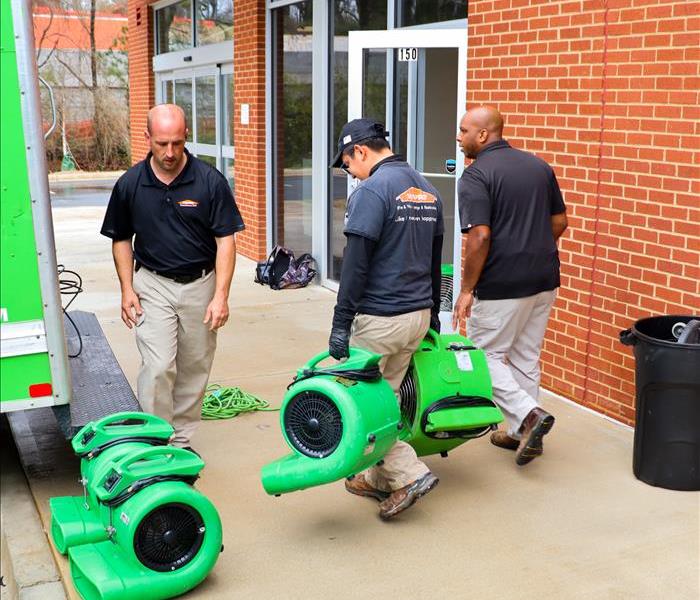 Our SERVPRO of NW Dekalb/Dunwoody/Brookhaven technicians are ready to assist you at a moment's notice. Call today for immediate assistance!
Our SERVPRO of NW Dekalb/Dunwoody/Brookhaven technicians are ready to assist you at a moment's notice. Call today for immediate assistance!
5 Simple Maintenance Tips to Prevent Water Damage in Your Home| SERVPRO® of NW Dekalb/Dunwoody/Brookhaven
Water damage is both expensive and inconvenient. SERVPRO of NW Dekalb/Dunwoody/Brookhaven, your local water damage expert, has seen this happen too many times. It will help you prevent water damage and lower your home maintenance costs in the long run if you take care of your property. You're undoubtedly feeling concerned if your home floods. However, by following these simple maintenance ideas, you can drastically reduce the risk of damage.
1) To prevent dampness and moisture, replace the old caulk around your windows.
We receive a lot of calls regarding window caulk water damage repair in Brookhaven, GA and the surrounding areas. Caulking your windows not only prevents water leaks but also helps to increase the efficiency of your air conditioner while keeping the outside air out of your house. It's a simple operation that any homeowner can complete. Depending on the type, caulking can last anywhere from five to ten years; nevertheless, you should check your caulking every year and replace it if it begins to fracture or peel off the window.
Exterior door flashings should be inspected to see whether there are any tears or rust that would allow water in. Caulking the doors will also help prevent early door flashing failure.
2) Check your water heater for leaks to avoid it from flooding and causing water damage.
When it comes to our emergency water cleanup services, heater failure is all too prevalent. Regularly maintaining your property may help you avoid a massive water heater flood. Make sure the temperature of the water heater's thermostat is set precisely and functioning properly to prevent pressure from developing, which may result in a leak.
Water heaters frequently develop rust or silt inside, resulting in undesirable tastes and odors in the water. If your water begins to make unusual noises, it's probably time for a checkup or a new water heater.
3) Immediately replace any leaking or damaged water hoses or connections on your plumbing appliances
Be on the lookout for any holes, kinks, fraying, deterioration, or corrosion on your plumbing's hoses and connections. If you detect any damage, have it repaired right away. In order to avoid pricey water damage expenses down the road, most manufacturers and plumbers recommend changing water hoses and connections every three to five years.
(5) Examine the roof and gutters for debris and any signs of moisture damage in the attic.
If the roof on your home does not drain properly, it may deteriorate. Water can seep into your property if this happens.
Look for dampness around vents, valleys, chimneys, pipes, and skylights. Any place on your roof with holes or connections is a potential source of leaks later on. If the flashing deteriorates as a result of weather, rusting, or losing its seal, water may flow into your house.
Check the inside of your attic for dampness or mold development. If you find moist, damaged, or moldy insulation, rotted or discolored boards or ceiling panels, or sheetrock puckering, you may have a leak on your hands.
6) Clean and inspect the HVAC condensation lines for any leaks or obstructions.
If your HVAC condensation lines become clogged, water leaks out and damages your home's surrounding areas. Check your condensation pipes on a monthly basis to ensure they're clear of debris.
Pour one-half cup of plain, white vinegar down the condensate drain once to four times a year to clear out blockages and grime. Bleach should not be used since it might harm your metal drain pan and cause it to degrade. If you detect an accumulation of debris or mold, our SERVPRO experts can assist you with any water damage.
We are Here to Help You with Any Water Repair Needs You May Have
If you have water damage in your house or workplace, call our team at SERVPRO of NW Dekalb/Dunwoody/Brookhaven for immediate assistance.
Our courteous, well-experienced staff are always happy to answer any questions you might have. Save our phone number in case you need help again in the future, or contact us right away for a prompt response from one of our IICRC-trained water restoration specialists.
We are always Here to Help!
Preparing For Vacation: How To Ensure Safe Water Systems
2/21/2022 (Permalink)
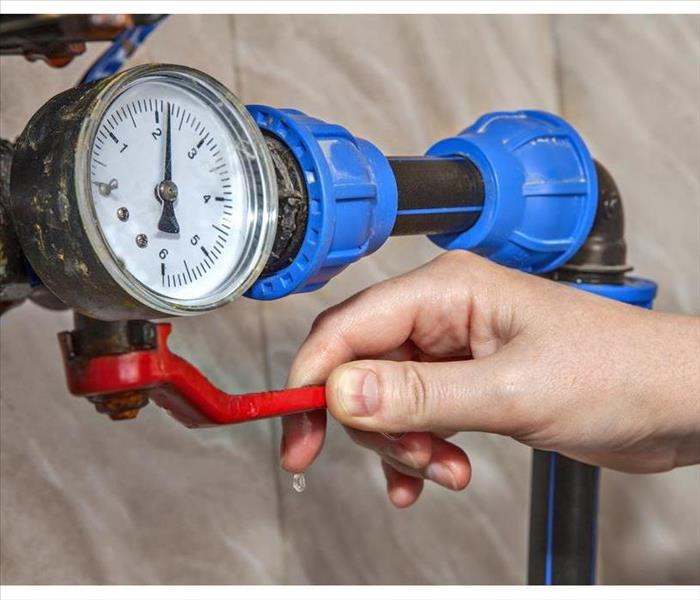 Turn off the main water supply.
Turn off the main water supply.
How To Ensure Safe Water Systems When Going On Vacation
Water pipe repair and flooded homes are difficult to deal with at any time of the year, but flooding issues can be exponentially costlier when you are on vacation if the water sits for an extended period of time before you discover it. For peace of mind while you are away, be sure that you take the following precautionary measures to ensure that no preventable water catastrophes happen in your home.
1. Keep Your AC On
This may seem counterintuitive, but keeping your AC on a higher temperature in summertime (or a lower temperature in wintertime) can prevent unnecessary condensation or pipe freezing. If your thermostat is programmable, set it to stay at a manageable temperature while you’re away.
2. Turn Off the Main Water Supply
Turning off the main water supply is perhaps the most important step to ensuring that you won’t have to deal with needless water pipe repair issues upon your return. If you have someone watch your home or your pets while you’re away, you can simply turn off pipe lines that lead to your appliances.
3. Check Your Sump Pump
Make sure your sump pump is in working order by pouring water into it. If it’s working properly, this should trigger the sump pump to turn on. If the pump is not working correctly, you’ll want to see about repairing it before you leave on vacation, to avoid further damages.
4. Change Your Supply Lines
Plastic lines break easily, so be sure to check supply lines and swap out any plastic lines with stainless steel lines. Stainless steel lines are inexpensive, so it’s well worth the small investment.
While you are preparing to leave on vacation, if you find that you already need to repair a broken pipe or locate a water leak, be sure to phone your local residential water damage specialists in Gainsborough, GA, to fix the problem. By settling all your water pipe repair concerns ahead of time, you can enjoy a relaxing, stress-free vacation.
Don’t Ignore a Toilet Overflow
1/26/2022 (Permalink)
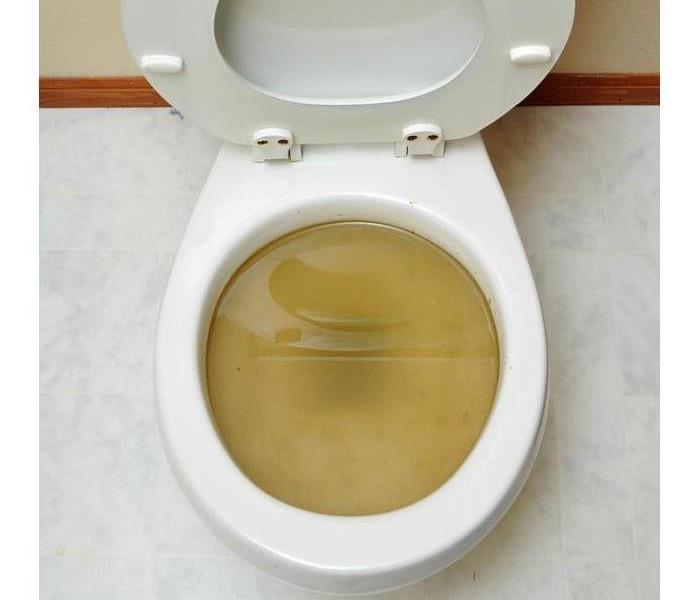 In overflowing toilet in a Brookhaven, GA home.
In overflowing toilet in a Brookhaven, GA home.
Steps To Handle an Overflowing Toilet
Sewer damage in your home is just repulsive to think about, but it is best to think about it before it happens so you are prepared to clean it up the right way. Here are some things you should know so you can handle an overflowing toilet in your home in Brookhaven, GA.
Not Your Average Flood
When you have sewer damage overflow, it’s not your average flood water. This means extra precaution is needed in the cleanup of a flooded toilet:
• Skin should be protected from exposure by wearing gloves and boots.
• Cleanup will require the use of antimicrobials and disinfectants.
• Some materials may not be cleanable and need to be replaced.
When it comes to clean up, you need to keep safety in mind because this is a black water flood.
Mold Growth
Proper cleanup must also consider the prevention of mold growth. A toilet overflow always comes at a bad time, and you may be tempted to go on to work with a plan to deal with the damage later. Delays in cleanup could cause problematic secondary damage, like mold growth. In just 48 hours, mold can start to grow. That may sound like enough time to go to work and come back, but then your materials would be so saturated with black water that it may take much longer to remove and dry everything. Once mold colonies start forming, it’s really hard to get them under control.
Professional Help
Who should you call for help? Don’t look for a sewage company to help because you need a full disaster mitigation specialist that can handle all aspects of cleanup and restoration. You want someone that is knowledgeable about black water cleanup including proper safety practices and prevention of secondary damage.
Summary
When you have a toilet overflow in your home, you want to prepare yourself for the additional complications associated with that type of problem. Professional sewage cleanup and water mitigation will ensure your home is restored to the condition it was in before the sewer damage.
What Is the Best Equipment for Draining a Flooded Basement?
12/16/2021 (Permalink)
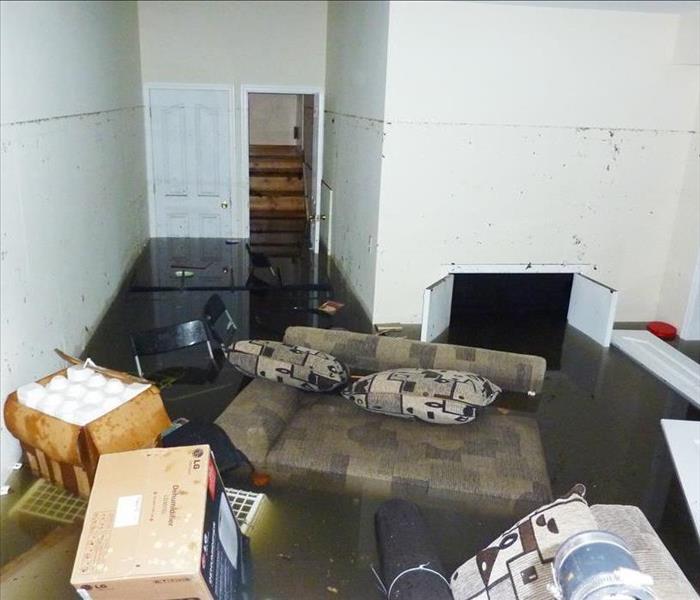 A flooded basement in Mount Vernon, GA.
A flooded basement in Mount Vernon, GA.
Steps To Clean a Flooded Space
Potentially caused by anything from a major storm to a burst water pipe, a basement flood can be a major cleanup job for any homeowner in Mount Vernon, GA, to tackle. If this is your first experience with draining water from the basement, you may need to obtain a few basic pieces of equipment to get started. Consider the following list of helpful tools for cleaning up a flooded space.
Submersible Water Pump
One of the most commonly used tools for water removal is an electric water pump. Be sure to look for a pump that is fully submersible and waterproof. When attached to your household garden hose, this pump begins the process of removing water from the inside of your home. You may need additional equipment such as the following:
- An electrical generator
- Nylon rope
- Heavy-duty extension cord
Wet/Dry Vacuum
In the case of a broken pipe, you may be able to catch leaks in the early stages before water levels get too high. For cleaning up a smaller water mess, you should consider using a standard wet/dry vacuum. Most models hold up to 5 gallons of water at a time and are easy to maneuver as you tidy up a small basement flood.
Dehumidifier
As with any case of residential water damage, getting moisture dried up as quickly as possible is the best way to prevent substantial water damage. Sitting water is one of the quickest ways mold and rot can develop in your home. A dehumidifier may help expel moisture in the walls and floor until professional flood cleanup services arrive at your home.
Check your home insurance coverage for information related to residential water cleanup. Many Mount Vernon, GA, residents already have insurance policies in place to offset the cost of major water damage and repair. As you begin draining water from a basement flood, consider using one or more of these useful pieces of equipment.
3 Reasons Your Home May Have Noisy Plumbing Pipes
11/29/2021 (Permalink)
 Noisy pipes in your Briarcliff, GA, home can be costly as well as annoying.
Noisy pipes in your Briarcliff, GA, home can be costly as well as annoying.
Understanding The Meaning Of Noisy Pipes
As a Briarcliff, GA, homeowner, you might be used to all the sounds your home makes, such as which floorboards and stairs creak or the noise of your heater cranking on at night. However, one noise that may spell trouble is when your home’s plumbing pipes start to make noise. Some of these noises may signal an imminent pipe break or flood, so understanding what they mean could help you head off major plumbing problems.
1. Humming
While some noise is common as you run water, noticeable humming could mean that your home’s water pressure is too high. As water runs through the pipes, the pressure causes them to vibrate, which creates noise. Failing to have your home’s water pressure checked could result in a pipe burst and considerable flood, so you may want to address this sound as soon as you notice it.
2. Banging
Banging pipes usually occur when you turn off a faucet and the remaining water in the pipe meets a closed valve. While this is not necessarily a sign of trouble, the water pressure in your home may need to be adjusted. This banging sound, which is also known as a water hammer, could result in a pipe break if the plumbing has any weak elbow joints. Having your plumbing inspected if banging noises increase may prevent a sudden flood.
3. Squealing
If your pipes squeal when you run the water, this could mean that a component inside or around the pipe, such as a washer, is starting to wear out. A water damage and mitigation service may be able to help you decide whether you need a plumber to fix broken pipe parts or whether the pipes need replacing.
Noisy pipes in your Briarcliff, GA, home can be costly as well as annoying. Recognizing the sounds they make may help you prevent a pipe break and untold flood damage.
“Do I have Water Damage On My Ceiling?” Steps to Take
11/5/2021 (Permalink)
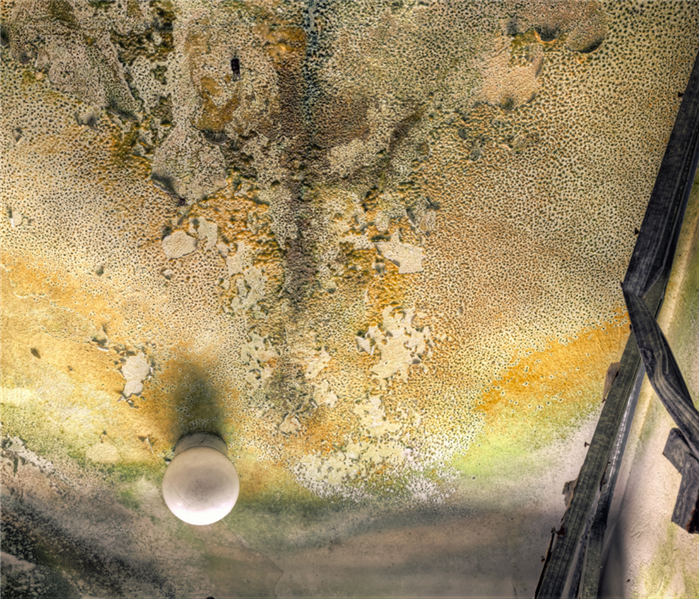 Water Damaged Ceiling Covered in Mold
Water Damaged Ceiling Covered in Mold
After a water damage event, your ceiling might become covered in water stains and mold. Before you call up your local ceiling repair company, there are several steps you can take to assess whether or not it's time to call the experts. This guide will explain what to do when there is water damage on the ceiling so that you can save money on emergency services and speed up the cleaning process. If you need help, consider hiring professionals like SERVPRO of NW Dekalb to remove excess water and repair damaged materials. Here’s what you should do after a water damage event.
How to Tell If Your Ceiling Has Water Damage
The first step in determining what to do when there’s water damage on your ceiling is knowing whether or not you actually have water damage. In mild leaks, this can start to appear as slight discoloration on the ceiling, or peeling paint. As leaks increase in severity, they can begin to crack the ceiling or cause the drywall to sag, bow, or shift. Because different types of damage require different solutions, it’s essential to first identify yours. Some are easy to spot, while others can be difficult for an untrained eye.
What Does Ceiling Water Damage Look Like?
Ceiling water damage can be difficult to see because of its location, but it can be easier than you think when you know what you're looking for. The top layer of drywall can become brittle and crumble if exposed to too much moisture. Look out for crumbling drywall or signs of mold growth. If you spot any discoloration or spots, then there’s a strong chance there’s some hidden water damage lurking behind your ceiling. When ceiling water damage becomes severe, it can cause cracking or peeling of the ceiling. Then, if water begins to collect, the ceiling can begin to warp and bow downwards. Don’t hesitate; act now! The longer you wait, the worse things can get.
If you think there is a potential for water entry, be sure to call SERVPRO of NW Dekalb for immediate assistance.
Track Down and Repair the Source
If you can, attempt to identify and stop the source of water from creating further water damage. When significant damage is suspected, our suggestion is to immediately notify your insurance provider and take photos and video of all affected areas before attempting to stabilize the situation. Keep in mind though, that in some cases attempting to stabilize the leak yourself can damage the area further. Proceed with care.
Stabilize the Area Around the Leak
Next, it’s important to stabilize any area around a ceiling leak. This may be as simple as taping off surrounding areas with plastic and tape or moving furniture away from wet carpeting or rugs. Avoid tracking water through your home to prevent the spread of any possible bacteria or pathogens inside after inspecting your ceiling for leaks.
Clean up all standing water as soon as you can, so it doesn’t have time to cause damage. Or, if the damage allows significant water entry, then professional equipment and expertise may be needed.
Call An Expert
If you are unsure of the source of water entry or the damage becomes significant, experts like SERVPRO of NW Dekalb have the right expertise and equipment to identify, control, and restore the situation. We will rapidly and effectively make your property "Like it never even happened."
Call us today at (770) 396-3883 if you need assistance.
We are always Here to Help.
How To Determine If a Toilet Should Be Replaced or Repaired
10/13/2021 (Permalink)
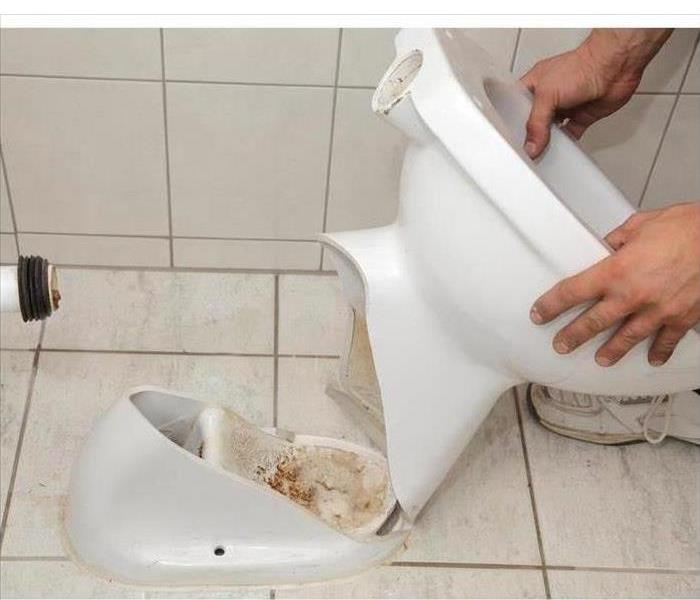 Many people put in a new toilet themselves, while others hire a plumber for the job.
Many people put in a new toilet themselves, while others hire a plumber for the job.
The most essential piece in the bathroom, if not the most glamorous, is the toilet. It should provide years of service with very little maintenance. However, now and again, this amazingly reliable device requires some attention. A leaking toilet often allows water to come out at the base, dampening the flooring and resulting in wet feet. If left alone, the water will soak into the wood and eventually cause the subfloor to weaken. The problem toilet should be fixed right away, either by a plumber or by a competent homeowner. The problem in these situations is often an old gasket, which can be replaced in a few simple steps.
Repair or Replace?
A leaking toilet in Gainsborough, GA, can almost always be repaired for just a little bit of money. Some situations, though, call for replacing an old toilet with a new one. Here are some common reasons for getting a new toilet:
- The commode keeps breaking down
- It is cracked
- It costs more to repair than to replace
- It is out of style or doesn't match the room
- The toilet is too low or too high
Many people put in a new toilet themselves, while others hire a plumber for the job. The new unit should work well for many years without much need for toilet repair.
Call or Wait?
If a leaking toilet causes water damage, a question arises on whether or not a professional water remediation team should be called. If the problem is minor, a homeowner can fix the leak and wipe up the water spill, making sure to dry out the entire area. If a spill, leak, or overflow results in contaminated water on carpeting, flooring, or other surfaces the professionals should be consulted. This is also true for any large or medium leaks that require wet vacuums to remove the water or a lengthy period of drying. Water damage, if not addressed properly, can continue to create problems long after a leak is stopped.
Preparing Your Home for an Extended Absence
6/28/2021 (Permalink)
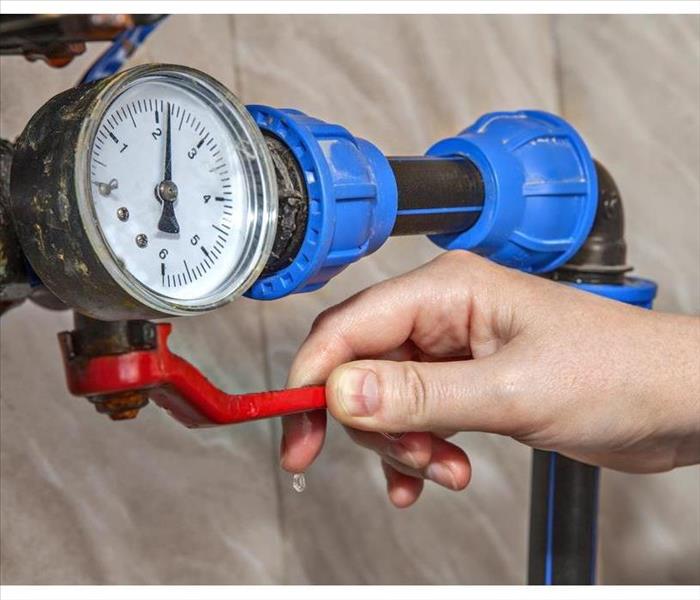 Turn off the water supply to your house.
Turn off the water supply to your house.
How Do I Prepare My Home For Extended Absence?
Are you thinking of ditching your Chamblee, GA, home for a two-week getaway on white-sand beaches? Perhaps you want to leave your home unoccupied for an entire winter to escape the cold. Whatever your plans, you should do what you can to prepare your house for an extended absence. If you fail to do this, you may come home to a flooded kitchen thanks to the unnoticed need for water pipe repair.
• Have it inspected. You may think all your plumbing is in working order, but leaks can be hidden within the depths of your walls. Calling in a plumber or residential water repair expert can help you make sure there are no hidden problems. Don't forget to have someone check your sump pump and other equipment to make sure your home is ready for heavy rain.
• Clean your gutters. No matter what time of year you're leaving, you should clean out your gutters before departing. Clogged gutters can allow rainwater to sit on your roof, which can increase the chances of leaks into your attic space and the rest of your house.
• Turn off the water. If you're going to be gone for a long time, you could turn off the water supply to your house. This can help protect you from a major water pipe repair as soon as you get back.
• Protect your pipes. If you are leaving for the winter, you need to make sure your pipes are well-insulated. This is especially true if you plan on turning off or lowering the heat. A frozen pipe can quickly turn into a broken pipe while you are away.
• Hire a sitter. Ask a neighbor, friend, or relative to stop by your home every few days. If the basement becomes flooded after heavy rain, a house sitter can catch the problem before it turns into a moldy issue.
Taking vacations is a great way to relieve stress. You can prepare your house for a vacancy to reduce the need for a water pipe repair when you get back.
4 Steps To Take After a Toilet Overflow
3/9/2021 (Permalink)
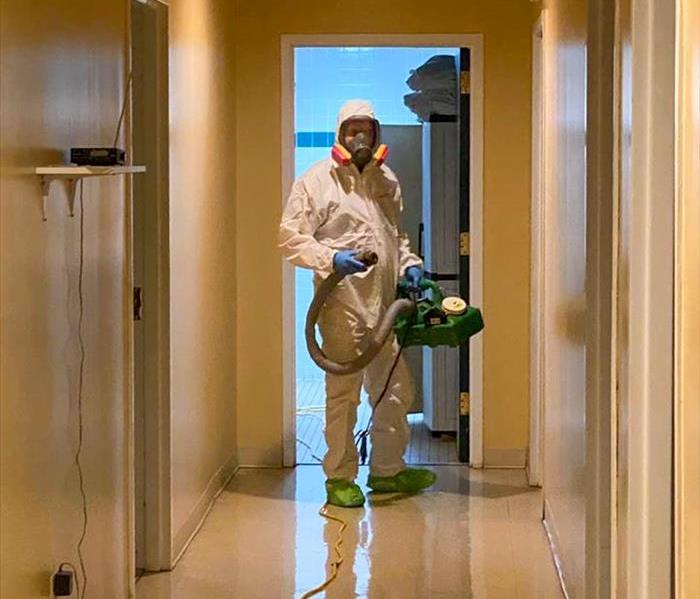 A toilet auger can be used to dislodge the clog.
A toilet auger can be used to dislodge the clog.
Here Are Four Steps To Take After A Toilet Overflow
Water should be considered a major enemy to your Brookhaven, GA home because of the sheer amount of damage it can cause. Sewer damage can be especially alarming, and no one wants to hear the sound of water sloshing to the floor in the bathroom. What should a homeowner do when the water starts gushing over the rim of the toilet bowl?
1. Turn Off the Water
Shut the water off the moment you sense the toilet might overflow. Most toilets have a water supply valve located on the wall behind the toilet. The valve is generally shaped like a football and is attached to the pipe or hose underneath the toilet tank. Turn the valve clockwise until you can’t turn it anymore. Alternately, you can turn off the main water supply to your home.
2. Plunge the Clog
Once you’ve shut the water off to the toilet, begin plunging the clog. Vigorously push the plunger up and down to clear the clog. It’s wise to place some old towels around the bottom of the toilet to catch any water that may land on the floor. Remember, sewer damage should be considered an emergency situation because of potential bacteria and viruses in the water.
3. Use a Toilet Auger
If a plunger doesn’t work, a toilet auger can be used to dislodge the clog. First, place the hook end of the tool into the drain hole. Next, turn the crank clockwise until it stops. This generally indicates that you’ve reached the cause of the clog. Finally, pull back on the auger and turn the crank counter-clockwise. The pulling and cranking should release the clog.
4. Call Emergency Professionals
If you feel inadequate at performing any of these steps, a professional sewage company can assist you. In fact, it’s wise to enlist the help of professionals who have the right equipment and protective gear to handle sewer damage.
A flooded toilet is an emergency situation that most homeowners will face at some point in their lives. Follow these steps to properly handle a toilet overflow.
3 Ways To Conserve Water
2/11/2021 (Permalink)
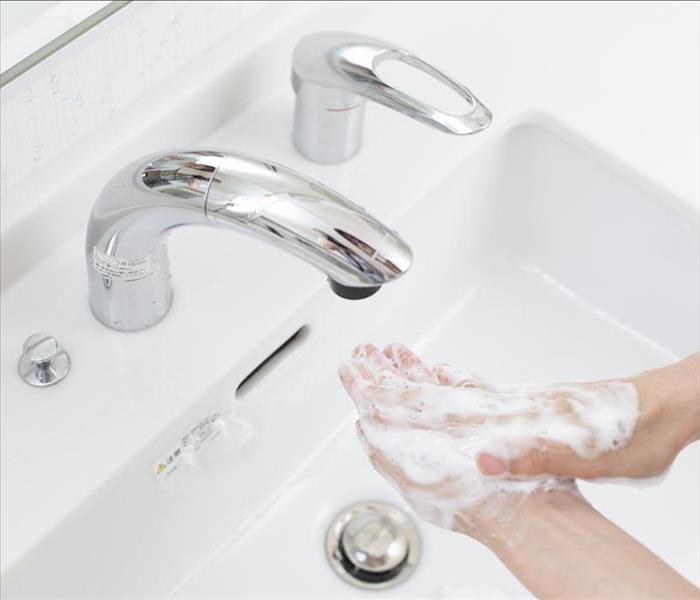 Install touch-free faucets.
Install touch-free faucets.
Three Ways To Conserve Water
Water issues in your community may have you looking for ways to cut costs and conserve water at your business in Brookhaven, GA. Not only is this good business sense, it's good for the environment, but it can be hard to know what to do.
1. Replace Faucets
Especially in a large office building, a lot of water gets used in bathrooms and kitchens. One water upgrade that will actually lower your monthly bills is to install touch-free faucets. The initial cost may be high, but the faucet won't be left running by a forgetful employee, and the upgrade will pay for itself over time. A less costly option is to replace the aerators on your faucets. Lower pressure means less water consumption. Hands still get clean, but you can save gallons of water.
2. Manage Irrigation
When does your irrigation schedule change? If the answer is "Never," it's an easy fix that will definitely save money and conserve water. There's no need to run the irrigation system during a rainy season. Even in dry seasons, you may not need to run the irrigation for as long as you think. The best way to decide this is to sub-meter your irrigation system so that you can see exactly how much water is being used for the plants. Try running the irrigation for ten fewer minutes at each session. If your plants don't die, you've found a way to save.
3. Check for Leaks
One major source of costly water issues is invisible leaks. There may be a single toilet in the building that runs all the time or a pipe deep in a wall that has developed a leak. If your water bill begins to creep up inexplicably, call a water damage restoration specialist to inspect your building. If they discover a leak, they will talk you through the process of getting it repaired, saving money and conserving water.
You care about the water issues in your community, your bottom line, and the environment. These tips can save money and conserve water for the benefit of your company and the community.
How To Handle A Leaking Light Fixture
12/28/2020 (Permalink)
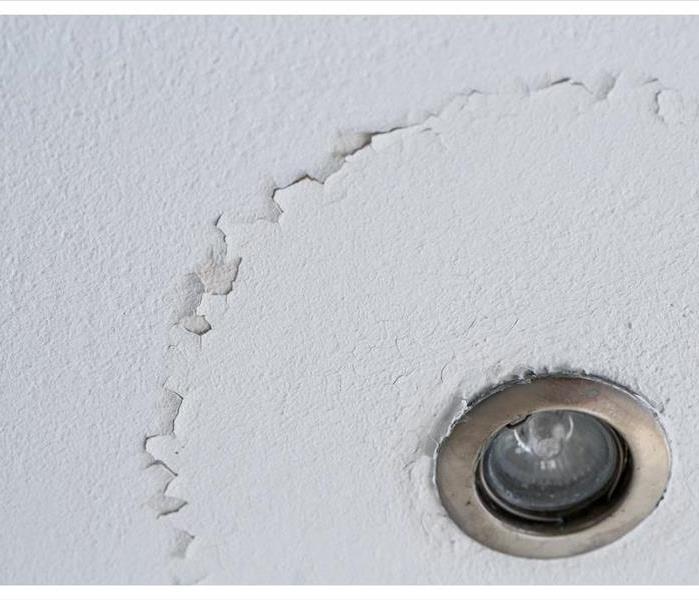 Water and light fixtures are a dangerous combination
Water and light fixtures are a dangerous combination
Here Is What To Do Instead Of Trying To Fix It Yourself
Short of a burst pipe or overflowing dishwasher that suddenly floods your home, water damage is often difficult to detect until extensive damage has occurred. One clue that you may discover first is pooling water in light fixtures. If you see this in your home, do not try to fix it yourself. Water conducts electricity, so water and light fixtures are a dangerous combination.
1. Turn Off Electricity and Water
Since you can't know the full extent of the ceiling damage and how much of your electrical system has been compromised, turn off the power to that affected region of the house as well as the water supply. Turning off the water supply will prevent additional water from building up in the light fixture. Alert anyone living in your household to the danger that you've discovered so that no one flips the breaker and gets hurt.
2. Call A Water Damage Specialist
A local water damage remediation specialist in Brookhaven, GA will be able to help you determine the extent of water damage in your home. They have special tools that allow them to measure the wetness levels in ceilings and drywall so that they know which areas need to be addressed rather than tearing down walls only to discover that there is no damage.
3. Work with an Electrician
Once a water damage remediation team has evaluated your home, they will be able to connect you with an electrician who can handle the water in light fixtures. The electrician will be able to safely remove and replace the fixtures as well as any wiring that has been compromised.
It seems ironic to advise that burns and electrocution are possible dangers of water in light fixtures, but those are most certainly safety hazards that you might face. Allow the professionals to handle this water damage cleanup for the safety of you and your family.
Understanding if Carpet Can Be Saved After a Pipe Breaks
11/23/2020 (Permalink)
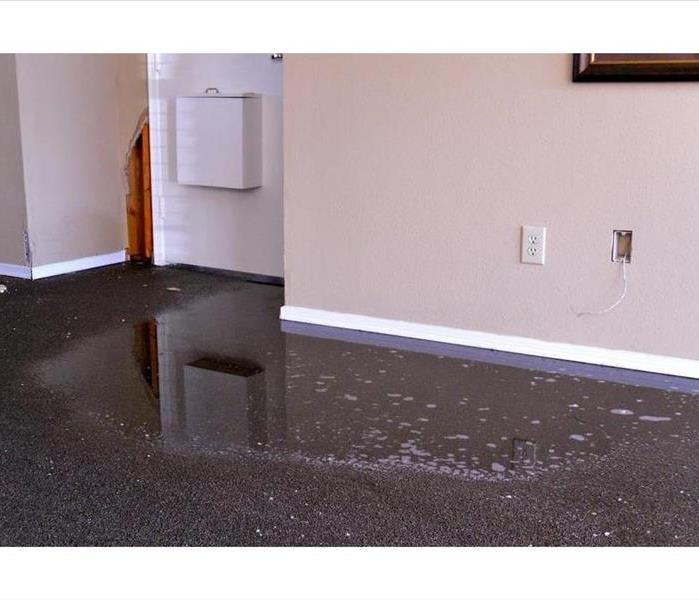 Carpet damaged by water
Carpet damaged by water
Tips To Help You Understand If Your Flooring Is Reclaimable
It’s safe to say that no homeowner welcomes the presence of unexpected water. Intruding water is commonly seen as an enemy due to its swift-moving and damaging nature. Fortunately, there are cleanup specialists who can assist with water damage cleanup. If you experience a pipe break, storm or overflowing sink in your Dunwoody, GA, home, you may be wondering if you can recover wet carpet.
Categories of Water
It’s essential to identify what type of water has caused damage in your home. The Institute of Inspection, Cleaning and Restoration Certification has classified the following categories of water:
- Clean water
- Gray water
- Black water
Category one, or clean water, is classified as such because it does not contain harmful contaminants. Examples for this category include water from sink overflows, appliance malfunctions and a pipe break. Category two water, or gray water, comes from sources such as urine from toilet bowls and sump pumps. Category three, or black water, is totally unsanitary and includes sewage water and ground surface water. If the water in your home is from a category one source, your carpet might be saved.
Proper Cleanup
It’s imperative that homeowners enlist the help of a certified cleanup company to guarantee that water is properly removed from their homes. There are specific steps to follow in water damage renovation including inspection, water extraction, drying, cleaning, sanitizing and restoration. During each step, professionals use specific equipment and procedures. Mold is a common concern when water accumulates. Experts can use advanced equipment to detect hidden moisture and identify any mold issues. By acting quickly, professionals can minimize the extent of water damage in your home.
A pipe break or unexpected storm is cause for serious concern. Fortunately, damage is minimized with the help of professionals who can salvage carpet if the water came from a clean source.
After the Flood: Can Your Important Business Documents Be Saved?
9/9/2020 (Permalink)
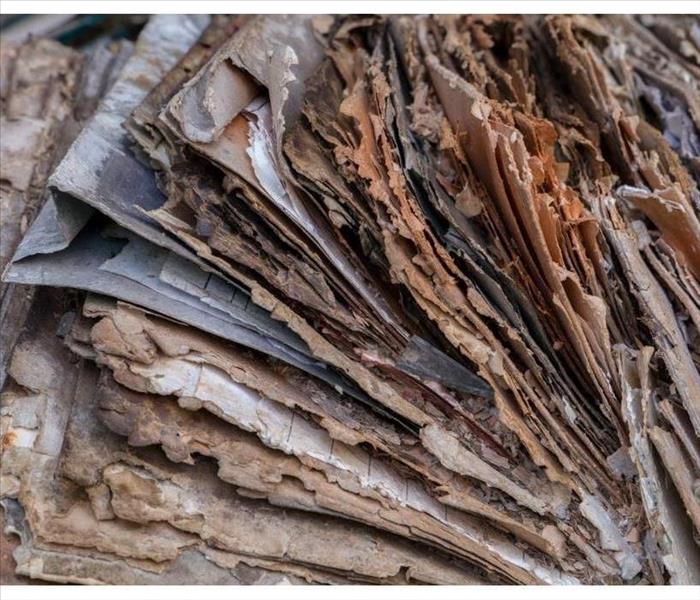 It’s every business owner’s nightmare: wet documents after a flood
It’s every business owner’s nightmare: wet documents after a flood
Overview Of The Document Restoration Process
It’s every business owner’s nightmare: wet documents and loss of inventory after a flood. It may feel like you’ll never recover your important paperwork, but an experienced water damage repair specialist can make your files can look like new. Here’s an overview of the document restoration process.
How Does the Cleaning Process Work?
Advanced restoration technology can get your files back to new, and the document drying techniques used by your specialist will depend on the extent and nature of the water damage. Most media will undergo a similar process which usually includes:
- Drying with the vacuum-freeze method
- Disinfecting with gamma irradiation technology
- Deodorizing to remove unwanted smells
What Kinds of Media Can Be Recovered?
You might be surprised at the kinds of content that can be recovered. Even the most delicate archival manuscripts, photographs, and books can be saved with the right technology. Other types of wet documents that can be repaired are maps, blueprints, and even X-rays. The files and documents you store in your office can be cleaned and restored along with any other paper media you may have.
How Can Documents Be Protected After Restoration?
Along with preventing water leaks and flooding before they start, the best thing you can do for the future of your business is to digitize your recovered documents for cloud storage. Some restoration service providers will even do this for you as part of their cleanup procedures. It’s a smart idea to invest in a digital backup service so you can archive your files off-site, without the worry that the only copies are stored within the walls of your building.
Business owners in Brookhaven, GA, have many responsibilities to fill daily. With a little prevention and planning, doing your own disaster recovery won’t be one of them. Rest easy knowing that even if you find wet documents in your office, they can be safely recovered, protected, and stored for the future.





 24/7 Emergency Service
24/7 Emergency Service